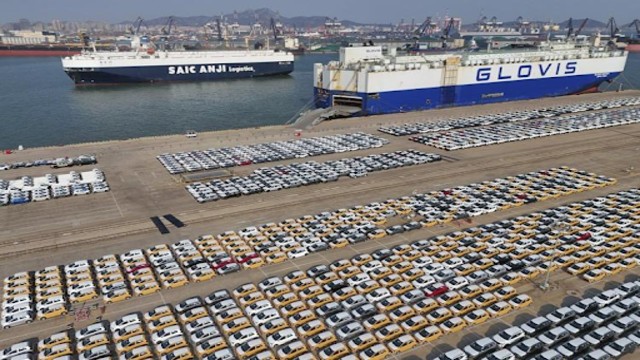
Vehicles and trucks for export wait for transportation from a port in Yantai in eastern China’s Shandong province on Jan. 02, 2025. (Chinatopix via AP)
China's exports saw a stronger-than-expected surge in December, driven by factories racing to fulfill orders ahead of potential tariff hikes promised by U.S. President-elect Donald Trump. According to official data released on Monday, exports grew by 10.7% year-on-year, surpassing economists’ predictions of a 7% increase. Imports, on the other hand, rose just 1%, outperforming expectations of a 1.5% decline. As a result, China's trade surplus expanded to $104.84 billion in December, and reached nearly $1 trillion for the year, totaling $992.2 billion.
Analysts attribute the export growth to businesses seeking to "front-run" possible higher tariffs that could impact the profitability of Chinese goods in the U.S. market. Zichun Huang from Capital Economics suggested that while China’s exports may remain strong in the short term, they could weaken later if Trump follows through with his tariff plans.
In December, exports to the U.S. soared 15.6%, while those to the European Union climbed 8.8%, and shipments to Southeast Asia rose by nearly 19%. However, economists predict that these robust figures may not hold if new tariffs are imposed, especially as global market share gains and a weak currency currently provide some resilience.
On the record trade front, China’s total imports and exports hit an all-time high of 43.85 trillion yuan (approximately $6 trillion), a 5% year-on-year increase. With this, China continues to solidify its position as the world’s largest exporter, maintaining trade relations with over 150 countries. Despite slower growth in the domestic economy, which has been impacted by factors such as the housing downturn and job losses, China’s export sector remains strong. Under the leadership of Xi Jinping, efforts to modernize manufacturing and shift toward high-tech production are proving fruitful. Last year saw a nearly 9% increase in exports of mechanical and electrical products, with high-end equipment exports jumping over 40%. Exports of electric vehicles, 3D printers, and industrial robots also showed impressive growth, with e-commerce trade alone surpassing 2.6 trillion yuan ($350 billion).
Despite the surge in exports, China has stated that it does not seek to run a trade surplus and has set its sights on boosting imports. However, imports were still overshadowed by exports in 2024, partly due to lower global commodity prices and weaker domestic demand. The Customs Administration suggested that China's market potential remains vast, with room for significant growth in imports, although trade restrictions from countries like the U.S. have limited the flow of some products, such as advanced semiconductors and military-related items.
China continues to focus on expanding trade with nations involved in its "Belt and Road" initiative, which aims to enhance global infrastructure and trade. Last year, trade with these countries made up nearly half of China’s total trade. Additionally, China has removed tariffs on imports from the world’s poorest nations. However, trade with traditional markets like the U.S. and Europe remains essential. Two-way trade with the U.S. grew by nearly 5%, underscoring the ongoing importance of bilateral exchanges.
Despite criticisms that China has relied on export growth to compensate for domestic economic challenges, the Chinese government rejects claims of "overcapacity." Officials argue that China’s industrial efficiency, driven by investment, innovation, and R&D, supports global supply chains and drives technological progress.
As China awaits its full-year GDP data for 2024, with a growth target of 5%, December's trade figures offer a glimpse of the nation’s economic resilience amid ongoing global trade tensions.















